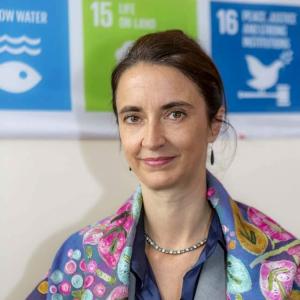Statement by Helena Fraser, UN Resident Coordinator at the Green Recovery Forum
Today’s Forum is an excellent opportunity to discuss where Uzbekistan stands in its recovery from COVID-19.
Excellencies, ladies and gentlemen,
It is an honour to join this forum to speak on behalf of the UN Country Team in Uzbekistan.
I am grateful to the Government, the European Union, UNDP and UNECE for organising this event. Today’s Forum is an excellent opportunity to discuss where Uzbekistan stands in its recovery from COVID-19, and how government, business, development partners and civil society can come together to accelerate policies and incentives for green recovery.
2021 is a vital year for our planet. In late 2020, the UN Secretary-General called on all Member States to declare a climate emergency.
In January, he urged the international community to accelerate ambition in advance of COP26 in November, ensuring COVID recovery and our planet’s repair are two sides of the same coin.
Transformational green policies are required, as my colleague Ms Spoljaric Egger has stated.
Such steps will ensure a sustainable economic recovery from COVID-19 and forge new paths for growth.
Here in Uzbekistan, the Aral Sea crisis indeed serves as a forceful reminder to us that human policies cause climate heating. The loss of the sea, due to deliberate irrigation practices, is a significant factor in the twice-higher than average climate warming in our subregion, and in the terrible dust storms, soil degradation and biodiversity loss that plagues the once-flourishing Aral sea basin.
Ladies and Gentlemen,
We know the solutions. And it is good that Uzbekistan has joined the community of nations in adopting national Sustainable Development Targets in areas such as climate change adaptation, mitigation, biodiversity preservation, waste management, energy efficiency and fossil fuel subsidy rationalization. Uzbekistan has also committed to decrease specific emissions of greenhouse gases (GHG) per unit of GDP by 10% by 2030 from level of 2010.
Yet we know more is needed. In line with the SG’s call, we encourage Uzbekistan to raise its ambition on all fronts.
Dear friends,
As Deputy Prime Minister Kuchkarov has stated, green recovery is not optional or an ‘add-on’. It is a must for economic growth.
The UN Country Team welcomes in particular “The national strategy for the transition to a green economy to 2030" adopted in 2019.
The strategy aims to contribute to the fulfillment of obligations under the Paris Agreement on climate change ratified by Uzbekistan in 2018, as well as the additional commitments under the national SDGs.
We also welcome the creation of the Interdepartmental Council for the Promotion and Implementation of the "green" Economy. It is important that this Council engages in continuous dialogue with national and international experts, Private Sectors, CSOs and Think tanks, thereby harnessing the innovation and capacity to accelerate green development.
Ladies and Gentlemen,
The UN Country Team and the International Financial Institutions have been supporting the Government of Uzbekistan to respond and recover to the ongoing COVID-19 pandemic, placing an emphasis on green recovery.
And as we look ahead to 2030, the UN family is placing climate action at the heart of our work.
Under UNDP’s leadership, UN agencies have set out an ambitious plan to support the Government to focus on sustainable, climate responsible and resilient development, as one of three strategic priorities under our UN Sustainable Development Cooperation Framework 2021-25.
Together we will continue work to accelerate the effort to transform the Aral Sea from a lifeless desert into a region of innovation and green technology, drawing on global good practice and maximizing the impact of the UN Multi Partner Human Security Trust Fund for the Aral Sea region.
Ladies and Gentlemen, in closing, let me suggest three important points to bear in mind during the discussions today:
First, a whole-of government approach is vital. Green recovery does not concern one or two ministries and state committees. Today’s discussions will emphasise the need for action across all sectors: energy, construction, water, agriculture, procurement, financing, health, education.
Second, a whole-of-society approach is a must. Civic engagement and public participation, including by women, youth, and rural communities, is key. Every child needs to know why they should not waste water or dump plastics, why green energy is vital to their futures, why they need new skills to join a workforce driven by green jobs.
And third, political leadership and a voice on the global stage are important. The will and the leadership is there – as we have heard. We look forward to seeing Uzbekistan engaging increasingly actively at regional and global levels, at ministerials and roundtables, including in the run up to COP26, sharing experience and taking bold action.
Dear friends,
There is no trade-off between economic progress and environmental sustainability. In fact, there are significant opportunities within a green economy for investment, growth and security.
Countries that forge new, more sustainable paths will be stronger, more resilient, more food secure, and more prosperous than before the pandemic.
I look forward to a stimulating dialogue over the coming two days to place a greener, more sustainable recovery at the heart of the COVID-19 recovery in Uzbekistan.
This is not only good for growth, but vital to the health and prosperity of society and of future generations.
Thank you.
Speech by








